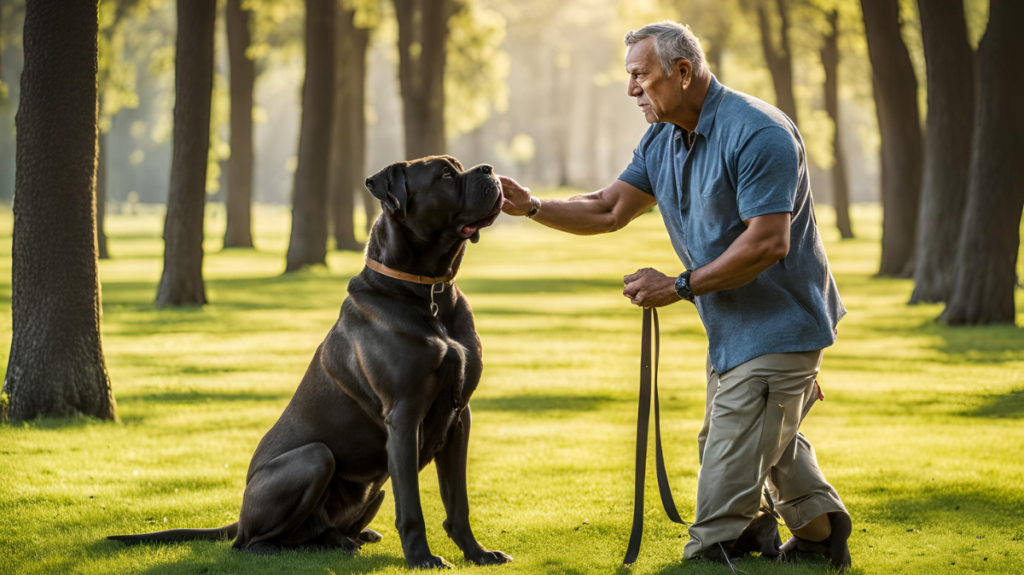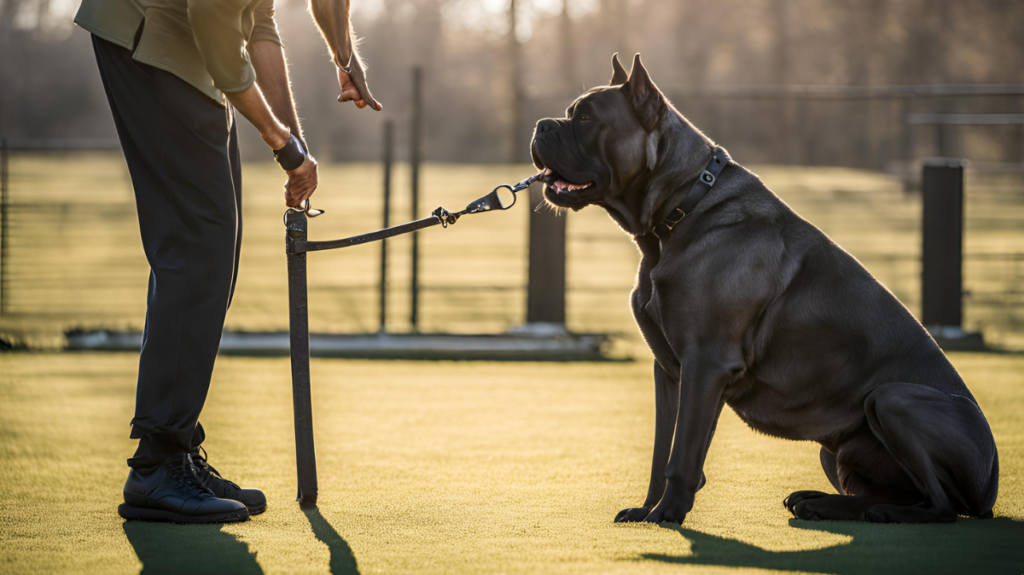Cane Corsos are known for their imposing appearance and loyal nature, making them both formidable protectors and loving companions. Proper training, however, is paramount to harnessing their potential. This article provides essential Cane Corso training tips to guide owners in raising a well-behaved and socialized pet.
By understanding these training principles, you’ll ensure your Cane Corso thrives in any environment.

Key Takeaways
| Training Aspect | Importance |
|---|---|
| Obedience | Ensures well-behaved dog |
| Socialization | Prepares the dog for various environments |
| Consistency | Promotes faster learning |

Understanding Cane Corso Behavior
History and Temperament
The Cane Corso is a breed that dates back centuries, originally bred in Italy as a guard dog. Known for their intelligence and protective nature, Cane Corsos are both agile and confident. Understanding their temperament is crucial for effective training.
Natural Instincts
Having strong guarding instincts, Cane Corsos need training to manage their natural protective behavior. Early intervention and socialization can curb unwanted aggressive tendencies.
Setting the Foundation: Basic Commands
Commands Every Cane Corso Should Know
Training commands like ‘Sit’, ‘Stay’, and ‘Come’ are fundamental. These basic commands enhance communication between the owner and the dog.
Teaching ‘Sit’, ‘Stay’, and ‘Come’
- ‘Sit’ Command: Guide your dog to sit using a treat as motivation.
- ‘Stay’ Command: Use hand signals to reinforce this command.
- ‘Come’ Command: Ensure safety by recalling your Cane Corso effectively.
“A well-trained Cane Corso can be both a guardian and a friend.”

Leash Training Techniques
Importance of Leash Training
Walking on a leash is more than just exercise—it’s a bonding experience. Proper leash training allows your Cane Corso to explore the world safely with you by their side.
Step-by-step Leash Training Guide
- Introduce the Leash: Allow your dog to get comfortable with the leash.
- Short Walks: Begin with short distances, providing rewards for good behavior.
- Consistency: Maintain a steady walking routine to instill discipline.
Socialization Strategies
Why Socialization Matters
Socialization prevents behavior issues and promotes a confident demeanor in your Cane Corso.
Tips for Socializing Your Cane Corso
- Expose your dog to new people, places, and creatures.
- Organize playdates with other dogs for positive interactions.
- Attend dog-friendly events and parks for an enriched social experience.

Advanced Training Tips
Incorporating Positive Reinforcement
Utilize positive reinforcement techniques like treats and praise to encourage good behavior. This method strengthens the bond between you and your Cane Corso.
Using Training Tools Effectively
Consider training tools like clickers and harnesses for advanced obedience training. These tools provide feedback and control, aiding in effective training sessions.
Addressing Behavioral Issues
Common Behavioral Challenges
- Protectiveness: Cane Corsos can be overly protective, which may lead to aggression.
- Separation Anxiety: This breed forms strong bonds and may struggle with being alone.
Solutions and Training Techniques
- Introduce calming commands to alleviate protection behaviors.
- Gradually increase alone time to reduce anxiety.

Importance of Consistency and Patience
Maintaining Consistency in Training
Consistency is key. Establish daily routines to reinforce training efforts and build trust.
Practicing Patience for Long-term Success
Remain patient throughout training, celebrating small victories while remaining firm yet gentle during setbacks.
“Consistency and patience are the main pillars of a successful training journey.”
Puppy Training Best Practices
Early Training Considerations for Puppies
Start with gentle exercises to build a foundation for advanced commands later on.
Setting a Routine for Young Cane Corsos
Develop a training schedule that aligns with your puppy’s energy levels, incorporating play and rest.
Expert Opinions and Recommendations
Experts recommend starting obedience classes as soon as your Cane Corso is of appropriate age. Professional guidance can provide tailored training plans that suit your dog’s specific needs.
Conclusion
Ultimately, training a Cane Corso requires dedication, consistency, and a deep understanding of the breed. By following these tips, you’ll lay the groundwork for a rewarding relationship with your dog.

FAQ
What age should I start training my Cane Corso?
Begin as early as 8 weeks to instill good habits.
Is professional training necessary?
Professional training, while not necessary, can offer specialized techniques.
How do I handle aggression issues?
Address aggression with calming techniques and consult an expert if necessary.




